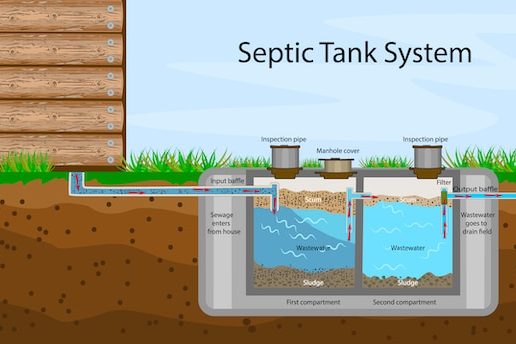There are two ways to deal with wastewater from our homes; a septic tank or the public sewer system. There are pros and cons to both of these systems although they both work to achieve the same outcome. As wastewater leaves our homes, we need to make sure that any of it that is released back into the environment is free of any harmful contaminants. To understand if a sewer or septic system is a better option, we need to first understand how each of these works to decontaminate water.
Sewer System
Most homes that are centrally located will be on the public sewer system. So, most people are more familiar with this option. However, many people still don’t understand how it actually works. The public sewer system collects all of the wastewater from the homes that it services and directs it to treatment facilities. This requires pumps to deliver waste where it needs to go and then chemicals to kill any bacteria before being released.
Septic System
A septic system is more common for rural homes where a public sewer system hasn’t been developed yet. These systems are self-contained and naturally treat wastewater before allowing it to filter into the ground water. Wastewater is directed into a holding (septic) tank where the initial breakdown of contaminants begins.
Bacteria that naturally occur in the tank do the majority of the work removing any harmful bacteria. This process is repeated as the water is moved further along in the tank. Finally, this water known as effluent, is directed through leach lines which allow it to slowly sink into the soil. This is the last step in decontamination as the soil acts as a final filter for any remaining bacteria.
Is a Sewer or Septic System Better?
So, back to the question “is a sewer or septic system better?” To answer that, we need to look a little more at the benefits and drawbacks of each option.
Cost
The cost associated with either a sewer or septic system is rarely from installation, and home buyers rarely have a choice in what system they will get. Its cost is factored into the cost of the home. Where the cost comparison really comes in is maintenance.
Public sewer systems charge homeowners a fee for using their treatment facilities. This monthly fee often depends on the amount of water you use and can even be incorporated into your monthly water bill. If large projects, such as repairs or improvements, are made to the sewer system these costs are passed along to homeowners through taxes and fees.
Septic systems are entirely the responsibility of the homeowner to maintain and repair if needed. The entire cost of any maintenance or repairs will be your responsibility alone as you don’t share the system with anyone else. If you properly maintain and care for your septic system these costs can be kept relatively low over time.
Maintenance
Another main difference in sewer versus septic systems is who is responsible for maintenance and the amount of control you have over the proper use and functioning of the system.
One of the best things about being on a sewer system is that you aren’t responsible for any of the repairs. The municipality will take care of any problem from clogging or breakage in public lines. This means less headache for homeowners when something goes wrong. On the other hand, individual homeowners have little control over the proper functioning of the system. Many people flush materials that don’t break down or create clogs. The municipality takes care of addressing these problems.
A septic system on the other hand is each homeowner’s responsibility to maintain and repair. This mean when something goes wrong you have to arrange for a company to come and take care of your problem. Although this does add to the responsibility of the homeowner, they also have a lot more control on the functioning of their system. With responsible usage, watching what you put into the system, and routine maintenance you can have very few problems and low costs.
Advantages
Each system has its own unique advantages that give it a leg up on the other.
Sewer systems are the easiest option for most homeowners. It gives them one less thing to worry about maintaining and the monthly cost is often worth the lowered level of responsibility.
Septic systems are generally considered to be more environmentally friendly when properly maintained. For some homeowners the natural process may be worth the added level of responsibility associated with this option.
So, Which Come Out on Top?
There is really no clear-cut answer. Sewer and septic systems both work effectively to remove contaminants from the wastewater and release it back into the soil but do so in different ways. Ultimately, as with most things, it comes down to personal preference and balancing the pros and cons of each.







